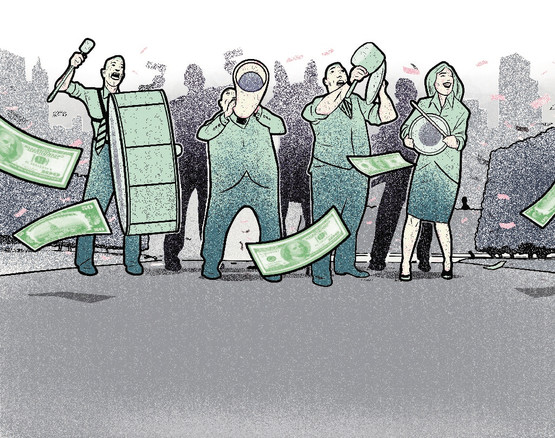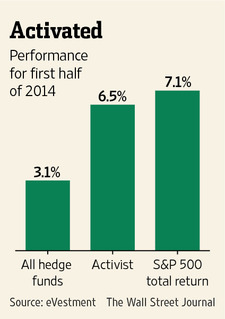|
THE WALL STREET
JOURNAL. |
MARKETS
|
Deals & Deal
Makers
Returns From Activist Hedge
Funds Are Causing a Stir
Hedge Funds That Clash With Companies Are Coming Up Winners
|
|
By
Rob Copeland
July 7, 2014 6:45 p.m. ET
Speaking
up is paying off.
Activists
are once again at the top of the hedge-fund heap, after a profitable
stretch of clashes with companies around the world.
Activist
managers gained 6.5% in the first half of the year, almost double the
total for the average hedge fund, according to data to be released
this week by research firm eVestment. Activist investing, in which
managers buy stakes in companies and then agitate for changes in the
form of buybacks, divestitures or management shakeups, was also the
top-performing strategy among hedge funds in 2013.
The fund
managers could earn millions for themselves—and billions for their
investors—if the gains stick through the end of the year.
But with
deal making near its historical peak, some investors and analysts
wonder if the activist rally could start to sputter.
William Ackman,
founder of Pershing Square Capital Management LP, is likely the
biggest winner among the larger firms this year. His main fund posted
a 25% gain in the first half, investor documents show, likely earning
his firm fees estimated at nearly $1 billion so far in 2014.
Mr.
Ackman has profited from his unusual backing of
Valeant Pharmaceuticals International Inc.’s bid for Botox maker
Allergan Inc., as well as a recent decline in the price of
Herbalife Ltd., the nutritional-supplements maker he is betting
against. Allergan traded at $116 a share before Pershing Square began
rapidly building its stake in April. Shares closed Monday at $165.85,
or 51% higher. Herbalife, which closed Monday at $66.18, is down 16%
this year.
Mr.
Ackman has long been known for his large, concentrated public bets.
But this latest rise of shareholder activism, which was earlier known
by less-flattering terms like corporate raiding, is creating new
standouts.
Keith
Meister spent most of his career as a little-known deputy of
Carl Icahn before striking out on his own three years ago to start
Corvex Management LP in New York. Since the start of last year, Corvex
has more than tripled in size to manage more than $7 billion.
Its main
fund is up nearly 11% this year, a person familiar with it said,
helped by the resolution of Corvex's battle against
CommonWealth REIT and the purchase of jeweler Zale Corp. by
Signet Jewelers Ltd., a large Corvex holding.
Despite
the strong first half from activists, they still trailed the broader
stock market: The S&P 500 rose 7.1% in the first half, including
dividends.
Hedge
funds as a whole gained about 3.1% in the first half, though most
managers profess not to measure themselves against the broader stock
market, because they aspire to do well in both rising and falling
markets, and because they also invest in areas outside equities.
Bolstered
by wealthy investors eager to profit from corporate changes, activist
managers continue to engorge with cash—they attracted some $4 billion
of new allocations in May alone, eVestment said.
"It's not
just the money that's gone in, but the world is more supportive of
what they are doing," said Justin Sheperd, chief investment officer at
Chicago-based Aurora Investment Management LLC, which puts more than
$9 billion into hedge funds. "It's a different environment today."
Activists
also are increasingly busy. According to FactSet SharkWatch, there
were 148 activist campaigns launched in the first half of this year,
the most since the financial crisis.
The tide
could yet turn if stock markets stumble. Many activists, as well as
others who bet on company changes, lost money in the second half of
2011, when economic uncertainty put the brakes on mergers activity.
Mr.
Sheperd said he was optimistic for the back half of the year, as long
as interest rates remain low, encouraging mergers and acquisitions.
However, he said if markets go "haywire," then activists could do the
same.
There are
some indications that the great swelling of many activist firms, which
has given them broader heft to agitate for corporate changes, may be
on the ebb. Jana Partners LLC, a New York activist firm that rose past
$10 billion under management this year, closed its largest fund to new
investment in the spring so it could better manage the growing size,
according to investor communications.
Jana,
which gained 8% in that fund in the first half, also is weighing
shutting off fundraising at its other fund in the near future, a
person familiar with the firm said.
Several
investors cited Jana founder Barry Rosenstein's reported purchase this
spring of the most expensive home in the U.S., a $147 million
beachfront mansion in the Hamptons, as a reminder of past market
peaks.
Mr.
Ackman, whose Pershing Square manages more now than it ever has
before, has actually seen more money leave than come in this year,
documents show, as some investors take money off the table.
Investors
have pulled more than $400 million from Pershing Square over the past
six months, though that sum represents less than 3% of the firm's
capital.
Other
well-known activists also posted solid starts in 2014, as Daniel
Loeb's $15 billion Third Point LLC and Trian Partners LP, part of the
$9 billion firm co-founded by
Nelson Peltz, each returned about 6%.
It also
has been a long wait for one big-name hedge fund that has increasingly
dabbled in activism in recent years.
Paul Singer's
Elliott Management Corp. is sitting on defaulted Argentine bonds and
related claims valued at as much as $2.5 billion, or 10% of the firm's
total assets under management.
As Mr.
Singer and Argentine officials tussle publicly over the repayment of
the bonds, however, the New York-based firm's Elliott International
Ltd. fund is lagging behind its peers. It is up just 4.1% in the first
half of 2014, an investor update shows.
Write to
Rob Copeland at
rob.copeland@wsj.com
|


